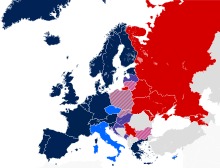Recognition of same-sex unions in Croatia
In 2003, one year after the first Gay Pride in Croatia, the then ruling coalition, consisting of mostly centre-left parties, passed a law on same-sex unions.Registering those relationship is not allowed, nor are rights in terms of tax, joint properties, health insurance, pensions, etc., included.[1][2][3] In early 2006, the Croatian Parliament rejected a registered partnership bill proposed by Šime Lučin (SDP) and Independent Ivo Banac[4] with 76 votes for, 22 against and 5 abstained.[5] MP Lucija Čikeš, a member of the then ruling HDZ, called for the proposal to be dropped because "all universe is heterosexual, from an atom and the smallest particle, from a fly to an elephant".Medical and psychological professionals did not support these statements, arguing that all members of Parliament have a duty to vote according to the Constitution of Croatia, which bans discrimination.The name of the law at that point was still unknown, but one of the proposed drafts was the Life Partnership Act (Croatian: Zakon o životnom partnerstvu).[17][18] [The Life Partnership Act] represents a democratic compromise, and creates conditions which will make all apparatuses needed to build a family life based on feelings of intimate emotional attachment and mutual trust available to same-sex communities, while at the same time expressing respect towards the current attachment of our fellow citizens to the traditional notion of marriage.[27][28] It was published in the official gazette on 28 July 2014, and it took effect 8 days later (i.e. 5 August 2014), except for the part on parental responsibility which came into force on 1 September 2014.Sanja Baric, a professor at the University of Rijeka, told the Balkan Insight that if such a narrow definition of the family had been established in law, a constitutional review would have likely overturned it.Should they decide to move to another EU country that recognizes same-sex partnerships or same-sex marriages, their life partnerships will be recognized according to the legislation of that country, respecting the right of EU citizens and their family members to move and reside freely within the territory of the member states.Most notably MPs from the SDP, HNS, HSLS, Green List and the Labour Party, as well as Vesna Pusić and Mirela Holy and former Croatian President Ivo Josipović.[55][56] In May 2013, a conservative civil initiative group "In the name of the family" collected more than 700,000 signatures for a referendum which would constitutionally define marriage as "a union between a woman and a man".According to the current law, turnout is not a condition for a successful referendum, thus enabling a minority of voters to change the Constitution.[71][72][73] Popular Croatian entertainers including Severina, TBF and Let 3 organised a concert gathering thousands of people in support of same-sex marriage on the Ban Jelačić Square.[81] In May 2018, the Social Democratic Party launched an initiative to amend the Constitution to prevent referendums designed with "reducing fundamental civil rights and freedoms".The Life Partnership Act implemented in 2014 also recognizes an institution similar to stepchild adoption called "partner-guardianship" (partnerska skrb).In case of a dissolution of a life partnership, the partner who is not the biological parent can maintain personal relationships with the child or children, should the court decide it is in their best interest.[87] In May 2012, Deputy Prime Minister and Minister of Social Welfare Policy and Youth Milanka Opačić expressed support for LGBT parenting and said that Croatia should progress to the point where it is acceptable and tolerated "but not just yet as the current situation could lead to discrimination of children from those families", arguing for taking a step-by-step approach regarding LGBT rights.In July 2012, Minister of War Veterans and member of the SDP Predrag Matić also expressed his support for adoption and said that society should not falter in achieving equal rights due to pressure from right-wing and radical circles.Minister of Economy Ivan Vrdoljak said that adoption should be allowed and expressed his hope that the Kukuriku Government would introduce it by the end of their mandate, which expired in 2015.[88][89][90][91][92][93] In July 2014, the Government passed the Life Partnership Act with a majority of MPs in the Croatian Parliament voting in favor.Minister of Administration Arsen Bauk has said that the Government has no intentions of changing the Life Partnership Act at this point, and it would leave this question for future parliamentary debates.Their attorney Sanja Bezbradica Jelavić stated: "The court's decision is binding, and an appeal is not allowed, so this judgment is final.The written ruling has not yet arrived, but as stated during the announcement, the court accepted our argument in the lawsuit, based on Croatian regulations and the European Convention on Human Rights.The decision followed the introduction of the Foster Care Act (Croatian: Zakon o udomiteljstvu) in December 2018, which excluded same-sex couples.

Marriage
Civil union
Limited domestic recognition (cohabitation)
Limited foreign recognition (residency rights)
Unrecognized
Constitution limits marriage to opposite-sex couples
¹ May include recent laws or court decisions that have not yet entered into effect.
IstriaLegal status ofsame-sex unionsMarriageAndorraArgentinaAustraliaAustriaBelgiumBrazilCanadaColombiaCosta RicaDenmarkEcuadorEstoniaFinlandFranceGermanyGreeceIcelandIrelandLiechtensteinLuxembourgMexicoNetherlandsNew ZealandNorwayPortugalSloveniaSouth AfricaSwedenSwitzerlandTaiwanThailandUnited KingdomUnited StatesUruguayIsraelAmerican SamoaCivil unionsBoliviaCyprusCzech RepublicHungaryLatviaMonacoMontenegroSan MarinoBermudaCayman IslandsMinimal recognitionBulgariaCambodiaHong KongLithuaniaNamibiaSint MaartenPolandRomaniaSlovakiaSame-sex union legislationSame-sex union court casesTimeline of same-sex marriageRecognition of same-sex unions in AfricaRecognition of same-sex unions in AsiaRecognition of same-sex unions in EuropeRecognition of same-sex unions in the AmericasRecognition of same-sex unions in OceaniaMarriage privatizationDivorce of same-sex couplesDomestic partnershipMilitary policyAdoptionLGBTQ rights by country or territoryCaribbean NetherlandsAruba and CuraçaoNiue, Tokelau, or the Cook IslandsBritish Overseas Territoriessome tribal nationsComan v. RomaniaEuropean Court of JusticeEU citizensguru–shishyanata prathamaitri kararpartnership certificatesCroatialife partnershipsCroatianunregistered same-sex unionsCroatian Parliament2013 referendumConstitution of CroatiacoalitionCroatian Peasant Partyfamily lawregistered partnershipPrime MinisterZoran Milanovićcivil unionInternational Day Against Homophobia, Transphobia and BiphobiaArsen BaukZagreb PrideMinister of Public AdministrationGovernmentofficial gazetteUniversity of RijekaBalkan InsightMinistry of Demographics, Family, Youth and Social Policysame-sex marriagessame-sex partnershipsCountyBjelovar-BilogoraBrod-PosavinaDubrovnik-NeretvaKarlovacKoprivnica-KriževciKrapina-ZagorjeLika-SenjMeđimurjeOsijek-BaranjaPrimorje-Gorski KotarŠibenik-KninSplit-DalmatiaSisak-MoslavinaVaraždin